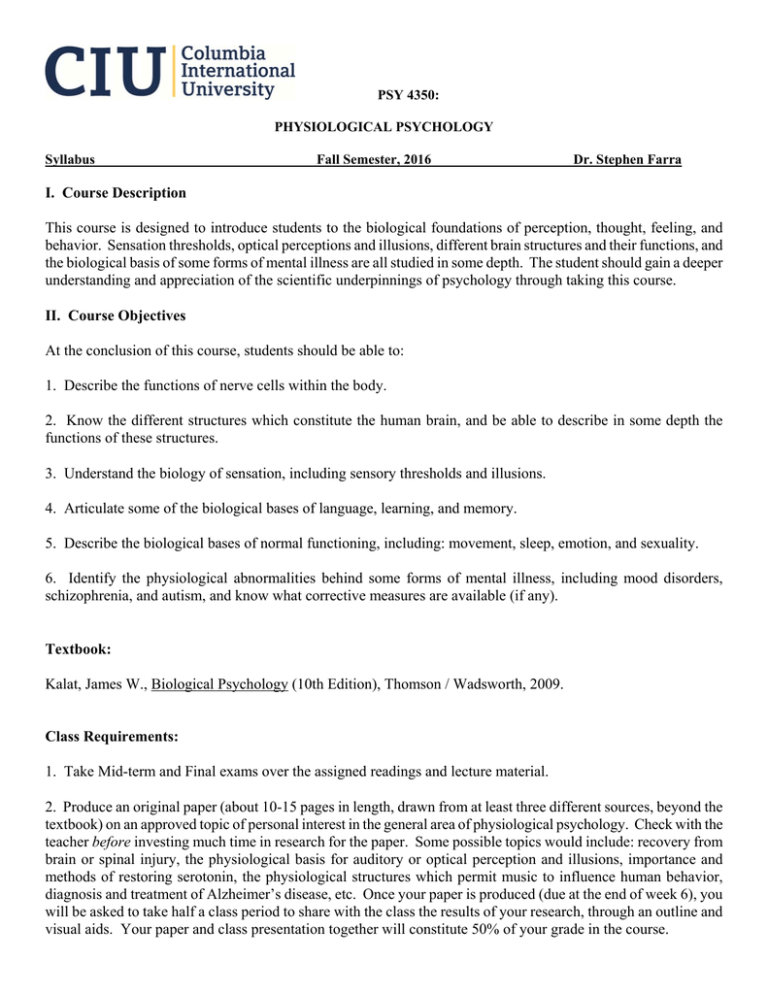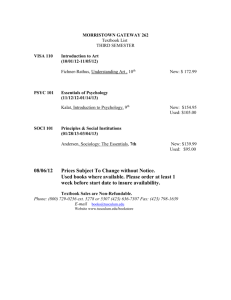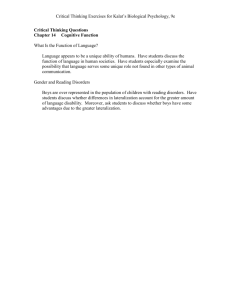I. Course Description This course is designed to introduce students
advertisement

PSY 4350: PHYSIOLOGICAL PSYCHOLOGY Syllabus ________ Fall Semester, 2016 ______ Dr. Stephen Farra I. Course Description This course is designed to introduce students to the biological foundations of perception, thought, feeling, and behavior. Sensation thresholds, optical perceptions and illusions, different brain structures and their functions, and the biological basis of some forms of mental illness are all studied in some depth. The student should gain a deeper understanding and appreciation of the scientific underpinnings of psychology through taking this course. II. Course Objectives At the conclusion of this course, students should be able to: 1. Describe the functions of nerve cells within the body. 2. Know the different structures which constitute the human brain, and be able to describe in some depth the functions of these structures. 3. Understand the biology of sensation, including sensory thresholds and illusions. 4. Articulate some of the biological bases of language, learning, and memory. 5. Describe the biological bases of normal functioning, including: movement, sleep, emotion, and sexuality. 6. Identify the physiological abnormalities behind some forms of mental illness, including mood disorders, schizophrenia, and autism, and know what corrective measures are available (if any). Textbook: Kalat, James W., Biological Psychology (10th Edition), Thomson / Wadsworth, 2009. Class Requirements: 1. Take Mid-term and Final exams over the assigned readings and lecture material. 2. Produce an original paper (about 10-15 pages in length, drawn from at least three different sources, beyond the textbook) on an approved topic of personal interest in the general area of physiological psychology. Check with the teacher before investing much time in research for the paper. Some possible topics would include: recovery from brain or spinal injury, the physiological basis for auditory or optical perception and illusions, importance and methods of restoring serotonin, the physiological structures which permit music to influence human behavior, diagnosis and treatment of Alzheimer’s disease, etc. Once your paper is produced (due at the end of week 6), you will be asked to take half a class period to share with the class the results of your research, through an outline and visual aids. Your paper and class presentation together will constitute 50% of your grade in the course. 3. Regular attendance and participation: Regular class participation, informed by the assigned readings, is expected. To encourage regular attendance, five grade points (half a letter grade) will be subtracted off the final class average for every absence beyond your third absence, for whatever reason. There is no provision for scholastic privilege, unless the student can demonstrate prior competency over a section of the course. The only exception to this policy would be for prolonged absence due to serious illness or injury. Psychology Department Policy Statement on Personal Electronic Devices in the Classroom: Unfortunately, because they are so often misused for non-emergency personal communication, Web surfing, and Facebook viewing, the Psychology Department has been forced to say that the use of personal electronic devices in the classroom is essentially banned. This includes cell phones set to vibrate, text-messaging on cell phones, and the use of laptop computers (except for multimedia presentations, presented to the class). The university classroom is a place to listen to professors and peers, and to discuss the significant ideas and skills that are being presented and demonstrated. Interference with this intensive learning process via personal electronics will no longer be allowed. Violations of this policy will be dealt with in the following manner: The first time a student is found to be using a personal electronic device during a class session, he or she will be required to leave the class on that particular day. The second time the student violates the policy, there will be a conference with the Dean of the College, to discuss whether or not the student should remain in the course for the rest of the semester. This will occur whether or not remaining in the course affects a student’s financial aid package, and his or her ability to stay in school. If a student is dismissed for violation of this academic policy, after the drop/add period established by CIU, a grade of “F” will be recorded on their transcripts for the course. There are only two exceptions to his policy: (1) If a student actually needs a laptop computer for classroom learning, the student must present (ahead of time) certification from the Disabilities Office / Academic Services stating the need. No non-disabled students will be permitted to use laptop computers, except for class presentations. (2) If a student is in the midst of a genuine crisis situation (e.g. - family health crisis), and anticipates a emergency text message, he or she must notify the professor ahead of time, and leave the classroom right after receiving the emergency text message. It is genuinely unfortunate that abuses of protocol have led to this departmental policy, but they have. The policy will be rigorously implemented and enforced. If this policy is not one the student wants and/or intends to follow, he or she is free to drop the course without penalty after the first class session, when the syllabus is reviewed. Grading: Paper: 40% Mid-term : 25% Class presentation/lecture: 10% Final Exam: 25% Flow of Course: Weeks 1, 2, 3 (August 22-Sept 9): Introduction to physiological psychology. The functions of nerve cells. Reading: Kalat, Chs. 1, 2, 4. Weeks 4, 5, 6 (Sept 12-30): Structures of the brain, and their functions. Reading: Kalat, Chs. 3, 5, 13. Paper due: End of week 6. Weeks 7 and 8 (Oct 3 – 14): The physiology of sensation. Reading: Kalat, Chs. 6, 7. - Oct 13-14 Fall Break Mid-term: End of week 8. Weeks 9 and 10 (Oct 17-28): The physiology behind stress and motivation. Reading: Kalat, Ch. 14. Class presentations. - Oct 25 Prayer Day Weeks 11 and 12 (Oct 31-Nov 11): Class presentations. Weeks 13 and 14 (Nov 14-25): Class presentations. - Nov 15 Prayer Day - Nov 23-25 Thanksgiving Break Weeks 15 and 16 (Nov 28-Dec 9): The physiology of emotions. Biology behind some forms of mental illness. Reading: Kalat, Chs. 12, 15. Final Exam



